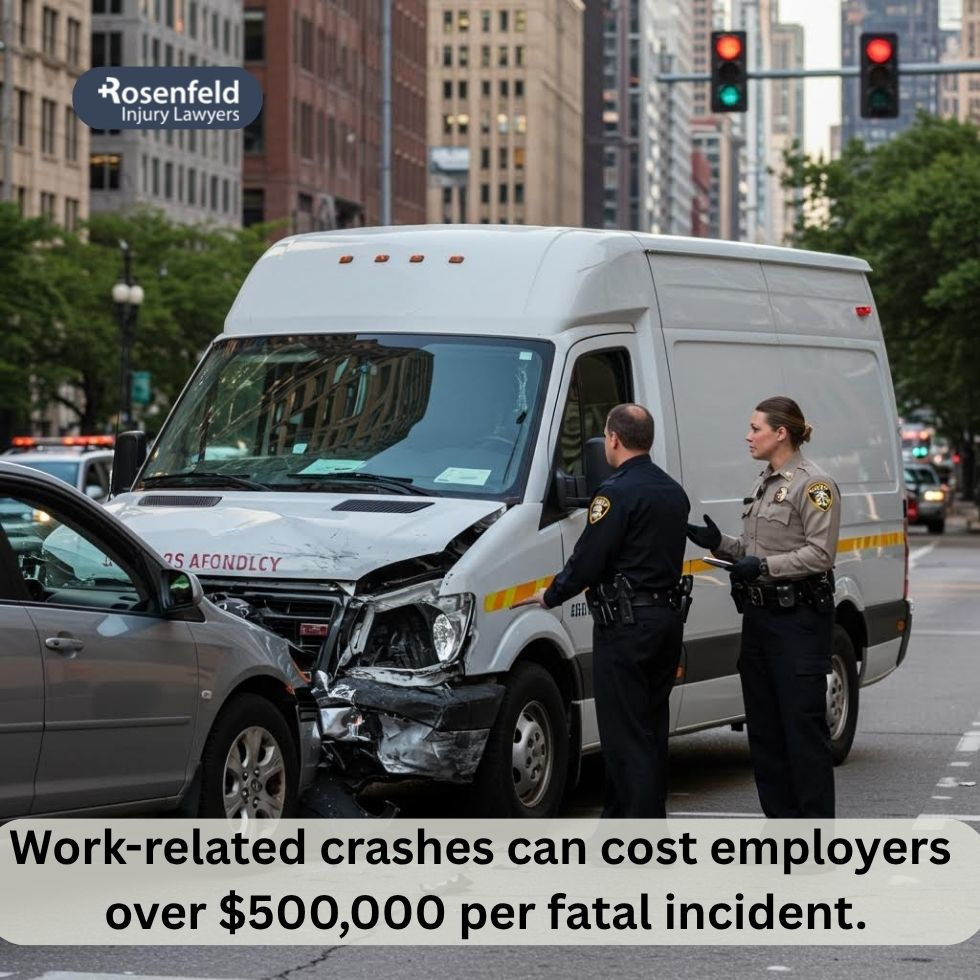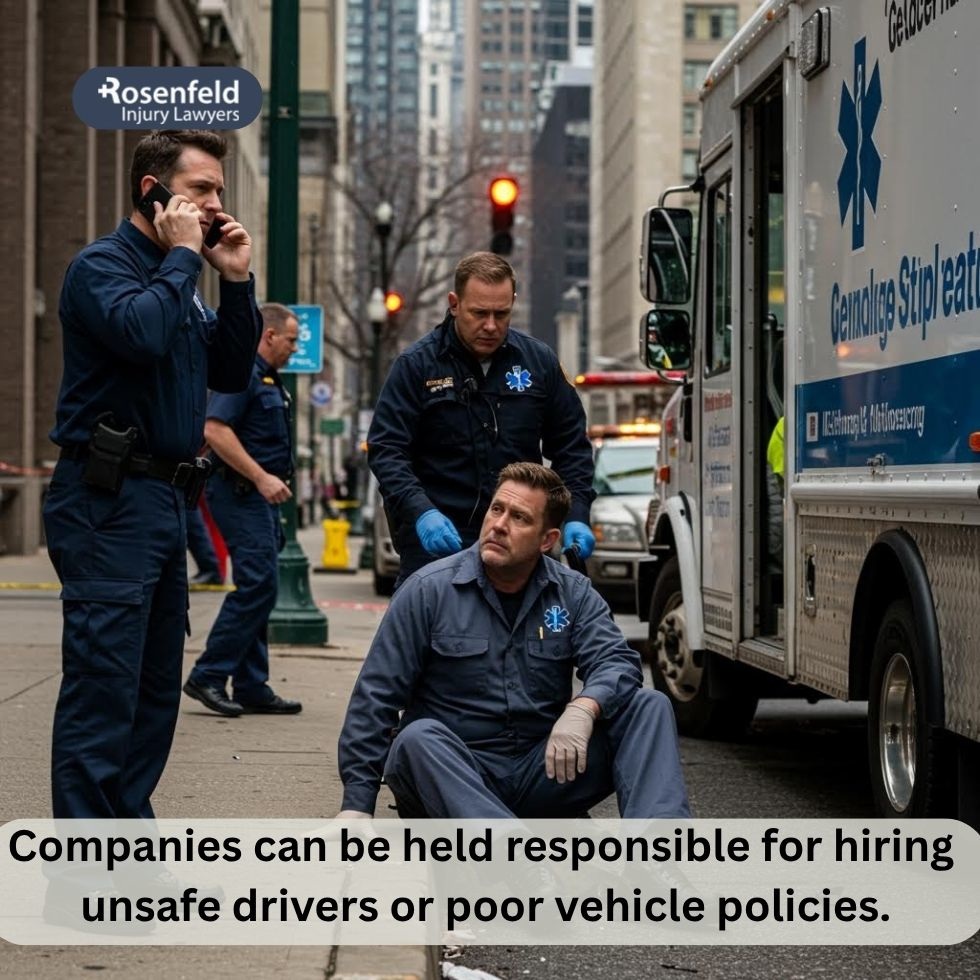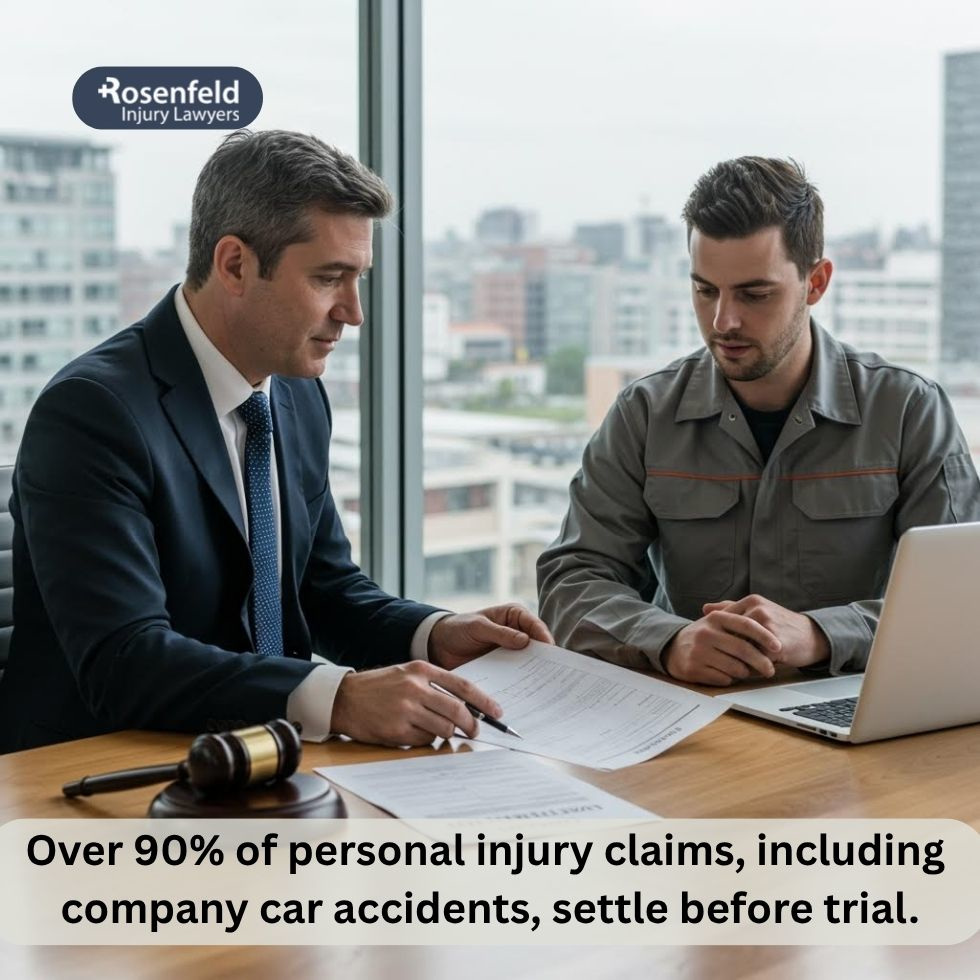- 24/7 Free Consultation: (888) 424-5757 Tap Here To Call Us
What Happens When You Get in an Accident in a Company Vehicle in Chicago

In a bustling city like Chicago, car accidents are common, particularly in high-traffic areas such as the Loop, O’Hare Airport, or on busy streets like Lake Shore Drive. But what happens when you get in an accident in a company vehicle? The situation becomes more complex, as determining fault and liability may not be straightforward.
If you’re involved in a crash while driving a company car, it’s important to understand how liability is assessed based on the scope of employment and whether the employee was performing work-related duties at the time.
In some cases, the employer’s insurance or workers’ compensation coverage may apply, providing support for medical bills, lost wages, and other accident-related expenses. Contacting a Chicago auto accident attorney quickly is crucial to preserving evidence, avoiding missteps, and beginning to build a strong case for workers’ compensation.

When Is an Employer Liable for a Company Car Accident in Chicago?
Liability is determined based on the specific circumstances of a company car accident. Under the legal doctrine of respondeat superior, an employer may be held responsible if the employee was acting within the scope of their job duties when the incident occurred.
In these situations, the employer may be considered the at-fault party and could be required to cover damages resulting from the crash, especially if the employee caused the accident while performing work-related tasks.
Examples of work-related use that may place liability on the employer include:
- Making deliveries for the business;
- Driving to a client meeting;
- Transporting tools, products, or other work-related equipment.
Liability can also apply in cases involving an independent contractor, though the legal standards differ and are typically more complex.
If the other driver caused the accident, that party’s insurer may be responsible for damages instead of the employer.
When Is the Employer Not Liable?
If an employee causes an accident while using a business car for personal reasons, such as running errands unrelated to work or engaging in reckless behavior like road rage, the business is usually not liable.
In these cases, the employee may be held personally liable, and their own insurance company would be responsible for covering any damages.
Situations involving mixed-use or unclear duties can become complicated quickly, especially if the driver’s activity at the time of the crash wasn’t clearly work-related. If the employer can prove the employee deviated from their job duties, liability may shift from the employer to the employee.
Ultimately, liability for a company car accident is determined on a case-by-case basis, depending on the nature of the employee’s activity at the time of the crash.
Who Pays for Damages After a Company Car Accident?
In situations where the employee was doing their job when a company car accident occurred and the employee was acting within the scope of their job duties, the employer’s commercial auto insurance typically covers the damages.
Many Chicago companies that provide fleet transportation units, like UPS, Amazon, and local courier services, carry comprehensive commercial policies to manage these types of claims.
If the employee was using the company car for personal reasons, they may be personally liable for the damages. In cases where another driver is at fault, that driver’s insurance provider would generally be responsible for covering the costs.
Additionally, if the employee is injured while driving a company vehicle for work purposes, workers’ compensation coverage may apply to cover medical expenses and lost income resulting from an accident in a company car.
Determining Fault in a Company Car Crash
When a company car is involved in an accident, determining fault is crucial for the success of any insurance claim. The police report, witness statements, and car accident reconstruction are key factors in establishing liability.
If a traffic violation, such as running a red light or distracted driving, contributed to the accident, these violations can shift liability onto the responsible party.
In Chicago, red-light cameras and intersection cameras can be valuable evidence to support a claim. Victims should work with an experienced car accident lawyer to gather and analyze all relevant evidence to prove fault.
Independent Contractors in an Accident with a Company Car
In Chicago, a car accident in a company car involving independent contractors can raise complex liability issues. Unlike traditional employees, independent contractors are usually required to carry their own insurance.
This means the employer is not automatically responsible if the contractor caused the accident. However, if the car accident occurred due to the business’s negligence, such as failing to maintain the car properly, the company could still be held liable for damages.
Rideshare companies like Uber and Lyft offer substantial insurance coverage, including up to $1 million in liability protection while the driver is actively working or en route to pick up a passenger. This added layer of coverage is intended to protect both the driver and other parties involved if the independent contractor caused the accident.
Understanding how this coverage applies and who is ultimately responsible typically requires legal guidance, especially when injuries or property damage are involved.

What Insurance Coverage Applies After a Company Car Accident?
Several forms of coverage may apply after a company car accident, depending on who caused the accident and the type of vehicle used.
If the employee was driving a company car and was acting within the scope of their job duties, the employer’s insurance policy typically covers car accident damages like repairs and medical expenses. In these situations, the at-fault party may also be liable, and their insurer could be required to pay damages.
If the vehicle manufacturer contributed to the crash due to a defect, product liability laws may apply as well. In cases where an employee was using a personal car for work—a common practice among many Chicago-based businesses—the employee’s personal auto policy may become involved, especially if the employer’s policy doesn’t provide full coverage.
Workers’ compensation may apply to injured employees, offering benefits for medical expenses and wage replacement regardless of who caused the accident.
What to Do After a Company Car Accident in Chicago
If you’re involved in a company car accident in Chicago, taking the right steps immediately can protect your health, legal rights, and ability to recover damages. In these situations, determining who caused the accident can get complicated, so it’s critical to protect yourself.
Here’s what to do:
- Per 625 ILCS 5/11-401, call 911 to report the accident to local authorities and request medical assistance.
- Seek medical attention right away, even if your injuries seem minor. Delayed symptoms are common, and medical records support your claim.
- Document the car accident scene by taking photos of any damage to the car, road conditions, and any visible injuries.
- Collect witness information and write down the license plate numbers of all cars involved.
- Notify your employer as soon as possible, especially if the company vehicle was involved in the car accident.
- File an insurance claim promptly through the employer’s insurer or your own, depending on the situation.
Company car crashes often raise complex liability questions, such as determining if the employee or the other driver caused the accident. For that reason, it’s essential to consult with a Chicago car accident lawyer who can help clarify responsibility.
An experienced attorney can help preserve evidence, protect your rights, and guide you through the legal process to pursue the compensation you deserve.

The Role of a Car Accident Lawyer
An experienced personal injury attorney in Chicago is essential when dealing with a company car accident, especially when the situation involves questions about who caused the accident and who should be held liable.
A lawyer can help gather critical evidence, review the circumstances surrounding the crash, and determine if the other driver caused the accident or if your employer may share responsibility. They’ll also guide you through the legal complexities that arise when an employee is using a company car for personal reasons, which can affect who is ultimately responsible for covering damages.
In these cases, a personal injury attorney will negotiate with insurance providers, pursue a fair settlement, and ensure your medical bills, lost wages, and damages are fully accounted for.
If the insurance companies fail to offer appropriate compensation, your lawyer can file a personal injury lawsuit on your behalf.
They’ll also help you untangle overlapping insurance coverage issues, especially when multiple parties or policies are involved. Having an advocate who understands the legal landscape gives you the best chance at recovering what you’re owed.
Get a Free Consultation with a Car Accident Lawyer

If you’re involved in a company car accident in Chicago, don’t wait to take action. Delays in filing your car accident report or insurance claim can negatively affect your case and your chances of receiving full compensation.
An experienced Chicago car accident lawyer can help guide you through the process, protect your rights, and maximize your compensation.
Contact us at (888) 424-5757 or complete our form to discuss your legal options.
All content undergoes thorough legal review by experienced attorneys, including Jonathan Rosenfeld. With 25 years of experience in personal injury law and over 100 years of combined legal expertise within our team, we ensure that every article is legally accurate, compliant, and reflects current legal standards.







